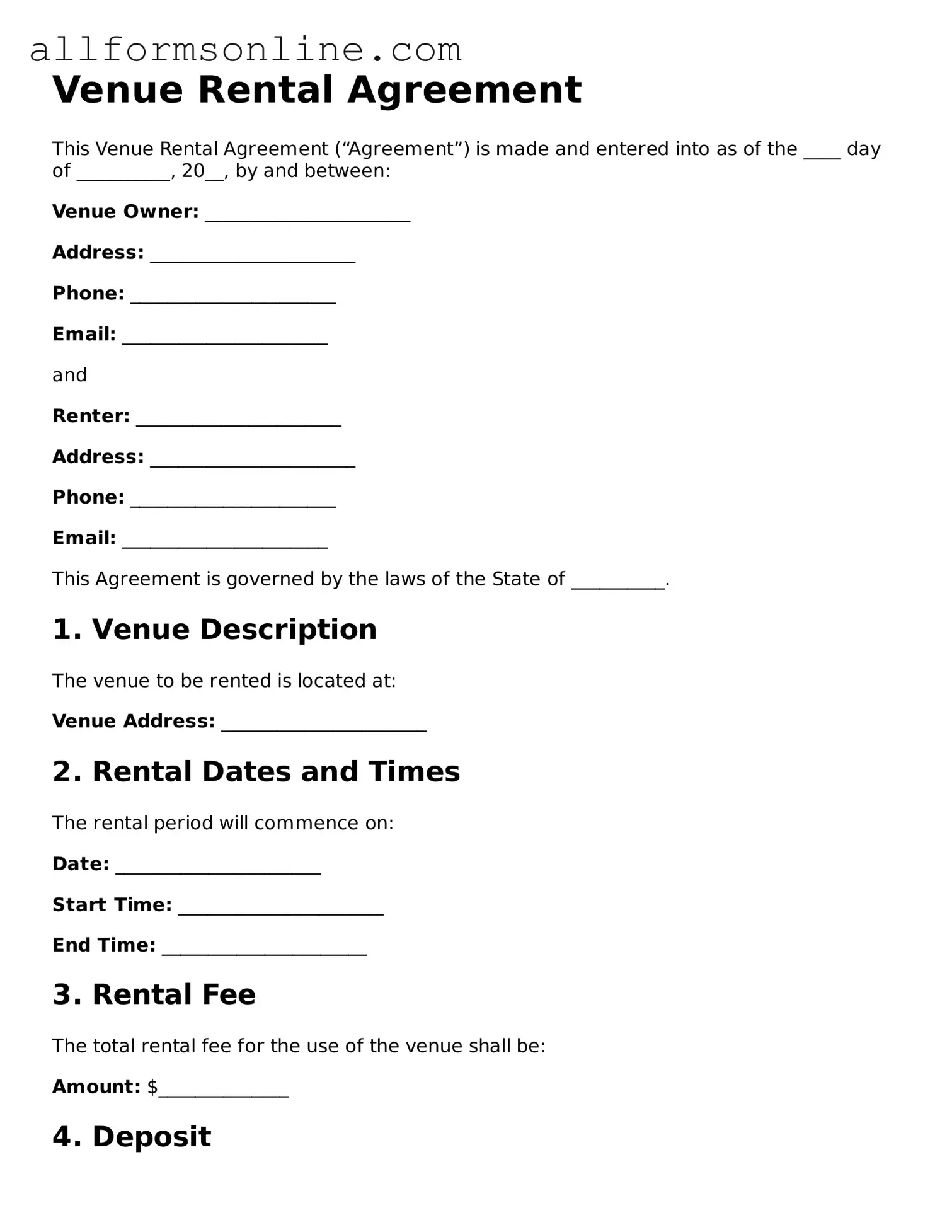Blank Venue Rental Agreement Form
Misconceptions
Misconceptions about the Venue Rental Agreement form can lead to misunderstandings and complications. Here are seven common misconceptions explained:
- All venue rental agreements are the same. Each agreement is unique and tailored to the specific venue and event. Terms, conditions, and fees can vary significantly.
- Verbal agreements are sufficient. Relying on verbal agreements can lead to disputes. A written agreement provides clear documentation of the terms agreed upon.
- Deposits are non-refundable. While many venues require a deposit, some may offer a refund under certain conditions. Always review the terms related to deposits in the agreement.
- Insurance is not necessary. Many venues require renters to have insurance to cover potential damages or liabilities. This protects both parties in case of an incident.
- All fees are included in the rental price. Additional costs, such as cleaning fees, security deposits, or overtime charges, may apply. It is important to clarify all potential fees in advance.
- Cancellation policies are the same for all venues. Each venue may have different cancellation policies. Understanding these terms is crucial before signing the agreement.
- Amendments to the agreement are not allowed. Changes can often be made, but they typically require mutual consent and should be documented in writing to avoid future disputes.
What to Know About This Form
What is a Venue Rental Agreement?
A Venue Rental Agreement is a legal document that outlines the terms and conditions under which a venue is rented for an event. This agreement typically includes details such as the rental period, payment terms, cancellation policies, and any specific rules or restrictions related to the venue. It serves to protect both the venue owner and the renter by clearly defining each party's responsibilities and expectations.
What should I consider before signing a Venue Rental Agreement?
Before signing a Venue Rental Agreement, it’s important to review several key aspects. First, check the rental fees and any additional costs, such as deposits or cleaning fees. Next, understand the cancellation policy; know what happens if you need to change your plans. Also, consider the venue's capacity and facilities to ensure it meets your needs. Lastly, clarify any restrictions, such as noise limits or catering requirements, to avoid surprises on the day of your event.
Can I make changes to the Venue Rental Agreement after it has been signed?
Changes to a Venue Rental Agreement can often be made, but they typically require the consent of both parties. If you need to modify any terms, such as the date or number of guests, it’s best to communicate with the venue owner as soon as possible. Document any agreed-upon changes in writing to ensure that both parties are on the same page and to avoid potential disputes later on.
What happens if I need to cancel my event?
If you need to cancel your event, the process will depend on the cancellation policy outlined in your Venue Rental Agreement. Many agreements include specific timeframes for cancellations, which can affect whether you receive a full or partial refund of your deposit. It’s crucial to read this section carefully and understand your options. If you anticipate needing to cancel, it’s advisable to discuss your situation with the venue owner to explore possible alternatives or solutions.
Popular Venue Rental Agreement Types:
Hunting Agreement Form - It can also outline procedures for early termination of the lease under specific circumstances.
In addition to understanding the components of the Lease Agreement form, landlords and tenants can benefit from utilizing resources like Fast PDF Templates, which provide essential templates and guidance to facilitate a smooth rental process and alleviate potential misunderstandings.
Week to Week Lease - The Weekly Rental Agreement promotes clarity by specifying payment due dates and acceptable payment options.
Printable Room Rental Agreement - Covers insurance requirements for tenants and landlords.
How to Use Venue Rental Agreement
Filling out the Venue Rental Agreement form is a straightforward process that requires careful attention to detail. This form typically includes sections for personal information, event specifics, and rental terms. Completing it accurately ensures a clear understanding between the parties involved.
- Begin by entering your full name in the designated field.
- Provide your contact information, including your phone number and email address.
- Specify the date and time of the event in the appropriate sections.
- Indicate the type of event you are planning.
- Fill in the expected number of attendees.
- List any specific requirements or requests for the venue.
- Review the rental terms and conditions carefully.
- Sign and date the form at the bottom to confirm your agreement.
After completing the form, it is advisable to keep a copy for your records. This will help in future communications regarding the rental agreement.
